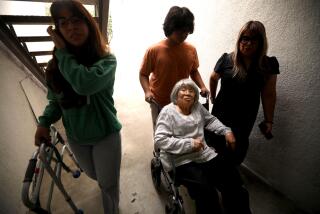Russian, Cuban Emigres Learn English
- Share via
ELIZABETH, N.J. — Hunched over notebooks and forcing themselves to speak unfamiliar English words, elderly emigres from Russia and Cuba struggle to learn the language of their new country.
Amid the heavy accents in the weekly class at a senior citizens center emerges a shared hatred of communism and the privations they endured in their birthplaces.
There’s also a lot of laughter from the “60- and 70-something” students over their linguistic mistakes.
“If they leave each time having learned one thing, they’re ahead of the game,” said Sydelle Spialter, an adjunct professor at Union County College. “I don’t sit on them too hard.”
The community college offers the free classes as part of its Learning Is For Ever, or LIFE, Center. The class is one of 21 taught on subjects from biology to Shakespeare at locations convenient for senior citizens.
College officials began the center in 1979 and have continued with the help of public and private donations. They say elderly people are eager to learn, but rarely try because they are embarrassed or afraid.
Spialter, herself a 62-year-old daughter of Russian immigrants, said transportation would be too big an obstacle for most of her 20 students if she didn’t come to the senior center.
The majority of students are Russian Jews, but there are also several Cubans as well as one Colombian.
Arriving for a recent class, the Spanish-speakers and Russian-speakers talked among themselves in their native languages as they sat along a cafeteria table.
Spialter snapped them into English with her arrival, asking for the date, calling the roll and using basic conversational phrases written on the blackboard.
It was a typical classroom situation.
The more confident students dominated the class, while the teacher tried to draw in the others. Spialter periodically shushed the more talkative students, who often sought to translate for the others.
The tone of the class was relaxed, although the students were earnest.
To one student Spialter offered some advice for answering the everyday question, “How are you?”
“In America, if someone asks you, ‘How are you,’ say, ‘Fine, thank you,’ even if your head hurts or your stomach hurts,” she said. “Nobody wants to know if you’re not fine.”
The 90-minute lesson moved on to practicing sentences using “have” and “has,” “want” and “want to.”
Said one student: “I want a good life.”
Another interjected, “You have a good life.”
Other students agree that they have a good life in their new country, and Spialter regularly mixes in quasi-civics lessons about “why life is better” in democracies.
The students, who depend largely on Social Security for their income, become most animated when they must explain why they left their countries. Their thoughts run ahead of their words as they talk of wanting better lives for their children and a desire for freedom.
“I had many problems in Cuba,” said Guinola Gomez, who came to the United States in 1968.
“I don’t have much hope of returning to Cuba because Fidel Castro has it so controlled,” Gomez, 65, said in Spanish after class. “I want to learn English so I can handle myself in daily life.”
Other students have similar expectations.
“When I go to the doctor, when I go outside my house, I need English,” said Sheymdlya Glazaman, a 68-year-old Russian who emigrated in 1979.
“I want to learn English to read, to write,” said Nina Kiner, 61, a Russian who emigrated in 1989. “I learn because I live in America.”
Spialter said immigrants have waited years, even decades, to learn. English-speaking relatives and others within their own communities have helped them in the meantime. The class allows the students to try English without fear or inconvenience.
“I’m sure they come out to learn the language, but it’s also a social thing for them,” Spialter said. “Anything too much more intense I’m not sure would suit their needs.”
More to Read
Sign up for Essential California
The most important California stories and recommendations in your inbox every morning.
You may occasionally receive promotional content from the Los Angeles Times.













